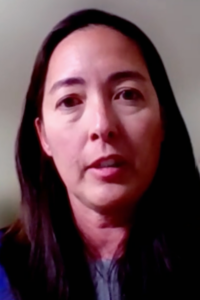Pediatric lupus is a troubling disease defined by a dearth of research, according to Aimee Hersh, MD, who presented the annual Edmund L. Dubois, MD, Memorial Lectureship on Saturday, Nov. 6.

Up to 20% of all systemic lupus erythematosus (SLE) patients experience childhood onset, accounting for up to 10,000 affected children and adolescents in North America annually. Children with lupus have higher rates of organ disease, including lupus nephritis, premature atherosclerosis with increased risk of myocardial infarction (MI), multiple skeletal deficits, and multiple psychosocial impairments that extend into adulthood.
“Most of the treatment approvals in childhood lupus have been extrapolated from adult studies,” said Dr. Hersh, Associate Professor and Chief of Pediatric Rheumatology at the University of Utah. “There are many unique aspects of childhood lupus, starting from why it occurs, the genetics and epigenetics, environmental exposures, and adverse childhood events, to how it affects childhood development, mental health, and treatment adherence over a lifetime. We need to know far more.”
Dr. Hersh described the pressing need for additional research into childhood lupus (cSLE) and efforts to create a collaborative research blueprint during her lecture, “Defining Research Priorities in Pediatric Lupus,” which can be viewed by registered meeting participants through March 11, 2022.
The Lupus Foundation of America and the Childhood Arthritis and Rheumatology Research Alliance (CARRA) are working with other stakeholders to better understand the knowledge gaps in cSLE and shape research priorities. Dr. Hersh heads the CARRA Research Committee, a key player in a 2019-2022 cooperative agreement with the Centers for Disease Control and Prevention to better define the natural history of childhood lupus, the best treatment approaches, and access to care using the CARRA SLE data registry.
One of the most obvious challenges in pediatric lupus is following patients from childhood through adolescence, into the often-difficult transition to adult care, and then into adult life, Dr. Hersh said.
“These children are exposed to the disease and to its treatments for a lifetime,” Dr. Hersh said. “We know they are at increased risk for early MI, osteoporosis, and psychosocial issues, but what about infertility? Cancer? Early mortality? It’s tough to keep up with and study individuals through an entire lifetime.”
CARRA is currently active at more than 175 sites across North America, representing more than 95% of pediatric rheumatology practices and more than 10,000 children with lupus. CARRA, the Pediatric Dermatology Research Alliance, and the Midwest Pediatric Nephrology Consortium surveyed members in 2017 and 2018 to assess and rank research needs. The top research priorities were defined as: nephritis; clinical trials/effective competitiveness; biomarkers; neuropsychiatric disease; and refractory skin disease.
A series of 29 interviews with cSLE experts helped narrow the focus to five action areas: expanding disease knowledge; promoting investigator collaboration; partnering with patients and families; improving care to optimize research; and overcoming investigator barriers. The next step is a series of interviews with cSLE patients and their families to better understand their needs, priorities, and preferences.
“Patient partnership — engaging patients and their families in research — is at the center of what we are doing,” Dr. Hersh said. “What is priority to them has to be priority for us, both clinicians and researchers. We have to meet patients where they are, not where it is convenient for us or for our research programs.”
ACR CONVERGENCE ON DEMAND
Meeting content can be viewed on the virtual platform by registered meeting participants through March 11, 2022. If you were unable to attend the live portion of the virtual meeting, an On-Demand All-Access Pass is still available for purchase.


